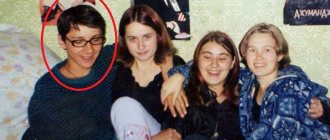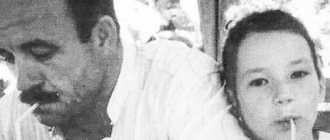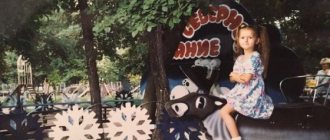Artist career
Despite the fact that Pavel was raised as an actress from childhood, he had no desire to follow in his mother’s footsteps. The future actor received his secondary education at a Jewish special school. Over the years of study, the guy quickly realized that he was closer to humanities and poetry. However, he was passionate about computers and was preparing to enter a specialized programming school.
However, ultimately the young man entered the studio school of the Moscow Art Academic Theater (MKhAT). As mentioned earlier, he did not plan to be an actor. And I went to the entrance exams with a friend. The girl did not pass the selection. Pavel entered the budget department, the course of Evgeniy Kamenkovich.
After completing his studies, the actor joined the troupe of the Moscow Drama Theater named after Yermolova.
Here is a list of productions in which he took part:
- We are not alone, dear!;
- Photo finish;
- Lunar waters;
- Slave to her lover;
- Deceivers;
- Pippi Longstocking;
- Mary Poppins, etc.
In 2014, the actor introduced the audience to his work - the one-man show “The Edge of Love” based on the poetry of the Silver Age. In addition, it also included works by Alexander Galich, the future star’s grandfather.
Instagram of Pavel Galich
"Forgive me for all"
— My mother, actress Valentina Arkhangelskaya , became the prototype of the main character of the film “Please blame Klava K for my death,” based on the story by Mikhail Lvovsky . Mikhail Grigorievich himself told me that all the events in the story are the true story of their relationship. He is a boy who has been in love with “Klava” since kindergarten. She is “Klava”. And the young man who turned his head and fought off the heroine is my father.
The parents met in 1941 at the front-line theater. They had love from the first rehearsal, at first sight. When we went to submit documents to the registry office, we kissed like crazy all the way on the bus and didn’t notice how the small suitcase that was standing between them disappeared. With all documents and food cards. It was in the small town of Chirchik near Tashkent, where director Valentin Pluchek and playwright Alexey Arbuzov gathered the remnants of their theater studio - their wives, Galich, mother, Zinovia Gerdt ... The parents got married during a break between trips with the theater troupe to the front.
After the war, my mother went to the Irkutsk Drama Theater in search of work. She didn’t want to sit at home and live in a big family, where her grandmother and father’s mother ran everything. Dad wrote mountains of letters to her, calling her home to Moscow. On one of his visits, his mother found out about his affair with Angelina Shekrot , a student at the screenwriting department of VGIK, and filed for divorce. Later I found out that she also had affairs in Irkutsk, and one very serious one. The young man's name was Leonid Iovich Gaidai ...
The last time I saw my parents together was at their dacha in Zagoryanka. When they left for the train in the evening, I suddenly realized that I would never see them together again. And so it turned out. Before leaving for Norway, my father wrote to my mother: “I’m sorry for everything. I love. Kiss. Sasha".
Filmography
The actor became famous for his role as Private Lavrov in the television series Soldiers. Many viewers remembered the young guy from the films Kitchen, Chkalov, Loop of Time.
Films and TV series in which Pavel Galich starred:
- Policeman from Rublyovka;
- Construction;
- Time loop;
- Taxi;
- Drilling 2;
- Soldier 16: Demobilization is inevitable;
- Two Antons;
- Univer;
- Breakthrough;
- Hunting on the asphalt;
- Soap drama, etc.
Personal life of Pavel Galich
Pavel's personal life is quite stable. At the moment he is in a civil marriage. He lives with his wife Yana and her son from his first marriage, Nikita. Before this, the actor was already married once. From his marriage, Pavel has two children - daughter Sophia and son Daniel. The actor loves all his children and, in general, can be called a wonderful family man. In one of the interviews, the actor admitted that he does not consider it correct to distribute household responsibilities based on gender, and therefore shares responsibilities equally with his wife.
Full biography of Alexander Galich
Option 1
Soviet poet, screenwriter, playwright, author and performer of songs Alexander Arkadyevich Galich (real name Ginzburg) was born on October 19, 1918 in Yekaterinoslav (now Dnepropetrovsk, Ukraine). In 1920, the Galich family moved to Sevastopol, and in 1923 they moved to Moscow.
In 1935, Galich Alexander was accepted into the Opera and Drama Studio of K.S. Stanislavsky, at the same time studied at the Literary Institute. A.M. Gorky, who soon left, linking his fate with the theater. In 1940, at the Moscow Theater-Studio of Alexei Arbuzov and Valentin Pluchek, he participated as a co-author (there were more than 20 of them), creator and actor in the play “City at Dawn,” which became a significant phenomenon in the theatrical and literary life of pre-war Moscow.
During the Great Patriotic War, released from the front for health reasons, Galich Alexander was one of the organizers, participants and leaders of the Komsomol Front Theater, wrote songs, ditties, plays, played the guitar, and performed for the soldiers.
After the war, Alexander Galich finally switched to literary work, first as a playwright, and then as a film playwright. His plays - “Taimyr Calls You,” “An Hour Before Dawn,” “The Steamboat’s Name is Eaglet,” “How Much Does a Man Need” and others were staged by a large number of theaters both in the Soviet Union and abroad. Based on his scripts, the films “True Friends” (1954), “On the Seven Winds” (1962), “Give me a Book of Complaints” (1965), “State Criminal” (1965), etc. were produced. In 1965, for the script of the film “State criminal” Galich Alexander received the USSR KGB award.
In collaboration with French filmmakers, he was the author of the film “The Third Youth” (1965), and with Bulgarian filmmakers, “Running on the Waves” (1967).
In 1955, Alexander Galich was admitted to the Writers' Union, and in 1958 to the USSR Cinematographers' Union.
In 1958, Galich’s play “Matrosskaya Tishina” (“My Great Land”), which was rehearsed by the studio of the Art Theater (later the Sovremennik Theater-Studio), was banned from production. The dramatic story of the last dress rehearsal of this play formed the basis of the autobiographical story “The Dress Rehearsal” (1973), the text of which includes the play “Sailor’s Silence” itself. In its finale, the programmatic words for Galich are heard: “Morality begins with truth.”
At the end of the 1950s, Alexander Galich turned to original song, becoming one of the most prominent representatives of this genre. The poet created a kind of song and poetry theater, in which the author was an actor, a musician, and a director.
His songs became increasingly deeper and politically acute, which led to a conflict with the authorities. Galich was forbidden to give public concerts, he was not published and was not allowed to release a record. He performed his songs in apartments, his songs were distributed and passed on to each other in tape recordings.
In August 1968, shocked by the entry of Soviet troops into Czechoslovakia, Alexander Galich wrote “The Petersburg Romance”, after which he was summoned to the secretariat of the Writers' Union and received the first serious warning about the inadmissibility of his repertoire.
In 1969, Galich's book of songs was published in Germany. In 1972, Galich Alexander was baptized by Father Alexander Men. All this, and especially his songs, caused increasing discontent among the authorities. In December 1971, he was expelled from the Writers' Union, and a few months later - from the Cinematographers' Union. After this, Galich was virtually prohibited from all types of creative activity; All rehearsals were stopped, performances were withdrawn from the repertoire, and the production of films that had started was frozen. Left without funds, Galich Alexander sells off his rich library, earns extra money through literary work, and gives paid home concerts. In the spring of 1972, he had a third heart attack, as a result of which he received a 2nd group disability and a tiny pension.
On June 25, 1974, under pressure from the authorities, Alexander Galich was forced to emigrate from the USSR. He lived in Oslo for about a year, where he lectured at the university on the history of Russian theater, then moved to Munich and finally to Paris. From August 1974 until the poet’s death, a permanent column “Alexander Galich at the Microphone” was published on the waves of Radio Liberty. He was also engaged in literary and concert activities in Norway, Switzerland, Germany, the USA, Israel, France; wrote several songs, the play “Flea Market,” and was going to stage a musical based on his own script, in which he himself wanted to act. In addition, together with Rafail Golding, Galich Alexander shot the documentary film “Refugees of the 20th Century.” On December 3, 1977, he gave his last concert in Venice.
On December 17, 1977, in Paris, Alexander Galich died from an accidental electric shock when the receiver antenna was turned on incorrectly. He is buried in the Russian Orthodox cemetery in Sainte-Genevieve des Bois near Paris. The inscription on the slab lying on his grave is taken from the Sermon on the Mount of Jesus Christ: “Blessed are those who are persecuted for righteousness’ sake.”
At the end of the 1980s, records, cassettes, CDs and books with his works and memories of him began to be published in Russia, and a documentary film “Alexander Galich. Exile". In 1993, when the poet’s citizenship was posthumously returned, “Days of Galich” were held in Dnepropetrovsk with the participation of leading songwriters of Russia and Ukraine.
Alexander Galich was married twice. Galich's first wife is actress Valentina Arkhangelskaya. In this marriage, a daughter, Alena, was born. The poet married for the second time in 1947 to Angelina Shekrot (Prokhorova). In 1967, Galich had an illegitimate son, Grigory. His mother is a costume designer at the film studio named after. Gorky Sofya Voitenko.
Option 2
Alexander Arkadyevich Galich (real name Ginzburg) was born on October 19, 1918 in Yekaterinoslav (now Dnepropetrovsk). His father was an economist, his mother worked at a conservatory. In 1923, the Ginzburg family moved to Moscow.
The poems of Alexander, then still a schoolboy, were appreciated by Eduard Bagritsky, the head of the literary circle where he studied; in 1932 they were published for the first time. In 1935, after graduating from school, Alexander entered the Literary Institute, then moved to the Opera and Drama Studio of K. Stanislavsky, and in 1939 to the Theater Studio of Alexei Arbuzov and Valentin Pluchek.
At the beginning of 1940, the studio debuted with the play “City at Dawn,” which became an event of the theater season. Alexander Galich was among the authors and performed one of the main roles. However, the performance only managed to be performed a few times - the war began. Most of the students went to the front, but Alexander was discharged - doctors discovered he had congenital heart disease. Having settled into a geological party, he went south, but only managed to get to Grozny. There, the young actor works for a short time at the Theater of Folk Heroics, and then leaves for the city of Chirchik (near Tashkent), where Pluchek gathered Arbuzov’s studio members.
In Chirchik, Alexander started a family - actress Valentina Arkhangelskaya became his wife; Soon their daughter Alena was born. The mobile theater under the direction of Pluchek and Arbuzov, in which Alexander and Valentina played, traveled around the fronts. Alexander performed in it in several guises at once - actor, playwright, poet and composer. In 1944, the theater returned to Moscow, but soon disintegrated due to a conflict between Pluchek and Arbuzov. Soon, Galich’s marriage also broke up - Valentina went to work at the Irkutsk Theater; the daughter stayed with her father.
Since 1944, Alexander Arkadyevich has been performing under the literary pseudonym Galich; it is composed of the first letter of his last name, the letters of his first name and patronymic. In 1945, he married a graduate of the VGIK screenwriting department, Angelina Shekrot.
In 1948, the premiere of the play based on Galich’s play “March” took place in Leningrad. The song from this performance, “Goodbye, Mom, don’t worry,” became a hit. A little later, another triumphant premiere took place - “Taimyr is calling you”; the comedy was written in collaboration with playwright K. Isaev, who later became Galich’s constant collaborator.
In the early 50s, Galich Alexander was already the author of several plays that were performed with great success in many theaters across the country: “An Hour Before Dawn,” “The Steamboat’s Name is ‘Eaglet,’” and “How Much Does a Man Need?” In 1954, the film “True Friends,” based on the script by Galich and Isaev, attracted more than 30 million viewers. In 1955, Galich was accepted into the Union of Writers of the USSR, and three years later - into the Union of Cinematographers.
In 1956, the Moscow Art Theater Theater (which later became the Sovremennik Theater) decided to open the season with a performance based on Galich’s play “Sailor’s Silence.” The then unknown Oleg Efremov, Oleg Tabakov, Igor Kvasha, and Evgeny Evstigneev were employed in it. The performance reached the dress rehearsal, but was not allowed by the censor.
Nevertheless, Alexander Galich remained one of the most successful playwrights. Theaters continued to stage performances based on his plays, and directors made films based on his scripts. In 1962, the film “On the Seven Winds” was released, in 1964, “Give me a book of complaints.” In 1965, Galich Alexander received the USSR KGB Prize for the script of the film “State Criminal”.
In 1967, Galich’s son Gregory was born; his mother is a costume designer at the film studio named after. Gorky Sofya Voitenko.
He has been writing songs since the late 50s. In 1961, Galich Alexander recorded the song “Lenochka” on a tape recorder, which became the beginning of a new stage in his work and life. It was followed by “Behind Seven Fences”, “Prospector’s Waltz” (“Keep Silent”), “Ask, Boys”, “The Horse Had angina pectoris”, “Red Triangle”, “We are no worse than Horace” and others. Magnetoizdat instantly distributed these songs, performed by the author with his own guitar accompaniment. They stunned with a measure of truth unheard of at that time, with daring irony, screaming pain, and an invasion of spheres tightly closed to censored poetry.
Galich's creativity developed in two directions: lyrical major and pathos in drama - piercing, angry sadness in songs. This duality irritated many. When Galich Alexander first performed several satirical songs at an amateur song rally in Petushki (1964), many participants in the rally accused him of insincerity and duplicity.
Meanwhile, the fame of Galich the bard continues to grow. In March 1968, he was invited to a festival of song poetry in Novosibirsk Akademgorodok. The festival was an unprecedented sellout. A huge hall was allocated for it, which was packed to capacity. Galich began with the song “Be silent,” and when he performed the song “In Memory of Pasternak,” the entire audience rose from their seats and stood silently for some time, after which they burst into deafening applause. Galich Alexander receives a prize - a silver copy of Pushkin’s pen, a certificate of honor from the Siberian Branch of the USSR Academy of Sciences, which says: “We admire not only your talent, but also your courage.” Subsequently, Galich Alexander said that this was his first and last open concert for which tickets were sold. For the authorities, what happened there served as one of the signals to start a fight not only with him, but also with the author’s song in general.
In August 1968, shocked by the entry of Soviet troops into Czechoslovakia, Alexander Galich wrote “The Petersburg Romance”; then he was summoned to the secretariat of the Writers' Union and received the first serious warning about the inadmissibility of his repertoire.
In 1969, Galich's book of songs was published in Germany. In 1972, Galich Alexander was baptized by Father Alexander Men. All this, and especially his songs, is causing increasing discontent among the authorities. In December 1971, he was expelled from the Writers' Union, and a few months later - from the Cinematographers' Union. After this, he was virtually prohibited from all types of creative activity; All rehearsals are stopped, performances are removed from the repertoire, and the production of started films is frozen. Left without funds, Galich Alexander sells off his rich library, works part-time as a literary “negro,” and gives paid home concerts. In the spring of 1972, he suffered a third heart attack and received disability, which provided him with a tiny pension. The authorities are pushing Galich to emigrate, and finally he gets tired of resisting. In June 1974, Alexander Galich and his wife left the USSR.
They lived for a year in Oslo, where Alexander Galich lectured at the university on the history of Russian theater, then moved to Munich and, finally, to Paris. From August 1974 until the death of the poet, a permanent column “Alexander Galich at the microphone” was published on the waves of Radio Liberty. He was also engaged in literary and concert activities in Norway, Switzerland, Germany, the USA, Israel, France; wrote several songs, the play “Flea Market”, and was going to stage a musical based on his works, in which he himself wanted to play. In addition, together with Rafail Golding, Galich Alexander shot the documentary film “Refugees of the 20th Century.” On December 3, 1977, he gave his last concert in Venice.
Galich died on December 15, 1977. The cause of death was his incorrectly connected TV antenna. There is still a version that it was not an accident, but a KGB operation.
Galich was buried in the Russian Orthodox cemetery in Sainte-Genevieve des Bois near Paris. The inscription on the slab lying on his grave reads: “It is blessed to expel the truth for the sake of it.” For some reason, the year of birth is indicated as 1919.
The day after Galich’s death, short rallies in his memory of Galich were organized during intermissions in two Moscow theaters - the Taganka and the Sovremennik. At the Satire Theater, after the end of the performance, a memorial evening was held; Galich's poems were read by Alexander Shirvindt.
At the end of the 80s, records, cassettes, CDs and books with his works and memories of him began to be published in Russia, and a documentary film “Alexander Galich. Exile".
Option 3
Alexander Galich is the author and performer of his own songs, playwright and prose writer, poet and screenwriter. The man’s real surname is Ginzburg, and Galich is a literary pseudonym, which the poet composed using letters from his own surname, first name and patronymic.
Childhood and youth
Alexander was born in the fall of 1918 in the Ukrainian city of Dnieper, formerly Yekaterinoslav, into a Jewish family. The boy’s mother Veksler Feiga Borisovna worked at the conservatory, and his father Aron Samoilovich worked in the economic sphere. Sasha is not the only child in the family; the boy had a younger brother, Valery, who already worked as a cameraman as an adult.
When Alexander was 2 years old, his family moved to Sevastopol, and 3 years later to Moscow. He finished school in the capital of Russia. Parents and teachers noticed the talent of the young writer already in childhood. Therefore, Galich’s first publication appeared in Pionerskaya Pravda when he was 13 years old.
Already at that age, Sasha knew that his profession would be related to creativity, but he could not completely decide in which direction. Therefore, after graduating from the 9th grade, the young man almost at the same time entered the Stanislavsky and the Literary Institute, which he soon dropped out of. And after 3 years he left the opera and drama studio.
In 1939, the young man entered the Studio Theater of Alexei Arbuzov and Valentin Pluchek. Alexander’s debut as a playwright took place after a year of study; in collaboration with other students, he created a script for the play “City at Dawn”. He also wrote songs for the play and played one of the roles.
At the beginning of the war, the guy was released from service for medical reasons. Later, with a geological exploration party, Galich goes to Grozny and there he enters the drama theater, where he works for several years. The poet’s move to Tashkent is connected with Arbuzov’s studio, who created a theater group and invited his former students there.
Music
Music appears in Galich’s biography in the late 1950s. The man writes songs and performs them himself, playing the guitar. When creating his original song, the bard relied on the romance tradition and soon became one of the brightest representatives of the genre. And with the advent of the first tape recorders, when songs were recorded and listened to several times, the recordings were changed, the man gained even greater fame.
Later, when creating collections, the man did not include the first recorded songs in them. And several works from 1959–1962 were banned by USSR government agencies because, in their opinion, they did not correspond to Soviet aesthetics. With a feeling of injustice towards his own creativity, Galich still continues to compose poems for songs, which each time become deeper and more poignant in terms of political attitude.
Of course, all this continued for a certain time and, in the end, led to a conflict with government authorities. A man is prohibited from giving concerts, releasing his own poems and recording records. In his youth, Galich became the only writer who chose freedom, abandoning a comfortable and prosperous life.
In defiance of the ban, the man secretly organized concerts in apartments, his listeners recorded and distributed cassettes with songs. However, KGB workers clearly monitored these moments, the tapes were often confiscated, and concerts were demanded to be cancelled.
However, this is not the worst thing that awaited Alexander Arkadyevich. In the spring of 1968, the bard decides to perform at a public concert, which took place as part of the art song festival in Novosibirsk. Among his other works, the man performs the song “In Memory of B. L. Pasternak.” And a month after this event, a publication appears in the local Novosibirsk newspaper where Galich is subjected to public censure. Immediately he received threats, a ban on performing songs and repression.
Trying to ignore the reaction of the authorities, a year later Alexander Galich released his first book, “Songs”. The printing is carried out by the “anti-Soviet” foreign publishing house “Posev”. For this, in 1971, right before the New Year, the man was expelled from the USSR Writers' Union, and the following year he ceased to be a member of the Literary Fund and the Union of Cinematographers.
During his work as an author of songs and poems, Galich created many works. Most of all, fans loved the book “When I Return”, the ballad about eternal fire and consciousness, the bard song “Once again about the devil” and his other works.
Movies
In the early period of his life, playwright Galich created only theatrical plays. In the period from 1946 to 1959, he wrote 6 plays, including “Boys Street”, “The Paths We Choose”, “How Much Does a Man Need”, etc. In 1958, the poet created a play called “Sailor’s Silence”. The premiere was planned to be held at the Sovremennik Theater, which was just opening at that time. However, the debut was not destined to take place, and for the first time the audience saw the production after the death of the author, in 1988.
In 1954, the man created the first scripts for films. The most memorable films for viewers and film critics were “On the Seven Winds”, “State Criminal”, “The Third Youth”, “Running on the Waves” and others. In 1964, for the film “State Criminal,” Galich was awarded a diploma from the KGB of the USSR.
Personal life
Galich met his future wife Valentina Arkhangelskaya in Tashkent. The woman was an actress. Her older brother Rostislav Arkhangelsky is a conductor and composer. The young people dated for some time, and after moving to Moscow they decided to legalize the relationship. And almost immediately after the wedding they began to think about children, so a year later Valentina gave birth to her husband’s daughter Alexandra. However, the poet's personal life was not always happy.
2 years after the birth of their joint child, Valentina decides to move to Irkutsk, as she receives a position as a leading artist at the local drama theater. Long-distance relationships are difficult for young people, and over time this leads to divorce.
Alexander Arkadyevich did not suffer from loneliness for long and in 1947 he remarried. This time the poet’s chosen one was Angelina Nikolaevna Shekrot. Despite her husband’s infidelities, the woman was with him until death, waited for him at home and loved him to the last.
In 1967, information appeared in the press about the birth of Galich’s illegitimate son. He was born to Sofya Mikhnova-Voitenko, who worked at the Gorky film studio. The boy was named Grisha and registered in his mother's surname.
The last years of his life were tense for Alexander Galich. Infringing on his rights as an author and performer of songs, blocking the path to further career development, government authorities contributed to the man immigrating from the USSR in 1974.
Moreover, the sources of those years voiced two versions of how he did it. Some say it was on an Israeli visa, while others claim that the emigration took place under the guise of going to a Norwegian seminar. 4 months after this, all the works of Alexander Arkadyevich - books, songs, poems and plays - were banned in the USSR and the man was deprived of citizenship.
After leaving the Soviet Union, Alexander Arkadyevich settled in Norway. There he released his first vinyl record, “A Whispered Cry,” with 12 tracks. On the cover of the record there is a photo of the author holding a guitar. Later, Galich moved to Munich, and then, for permanent residence, chose Paris.
Death
After moving to another country, Alexander settles down his life with his wife. However, their idyll in the new place did not last long. The tragedy that happened to the poet was apparently destined by fate.
One day, Galich’s wife went shopping, and at that time the man decided to connect the antenna to the TV himself. As a result of an electric shock, the man died on December 15, 1977. The cause of death was an electrical discharge that Galich received due to improper handling of electrical equipment.
When his wife found him in the apartment, he was still alive, but since the doctors took a long time to get to the scene of the tragedy, they could not save Alexander. For some time there were rumors that the poet did not die by accident, but that his murder was prepared and planned in advance. However, this version has not been confirmed, and everyone who was at the scene of Galich’s death also claims an accident.
The funeral of Alexander Arkadyevich took place 7 days after his death. The poet's grave is located in Paris, in the Russian cemetery.









